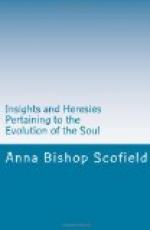Fanaticism is the law of some minds, and it will display itself in whatever arena they are engaged. In politics the man they vote for is almost a god. In mechanics, they have invented a machine which shall ensure “perpetual motion;” in chemistry, the elixir of life, or a cure for all the ills of human life; in morals, the kingdom of heaven is speedily coming through the intervention of their dead friends.
The truest religion is that which adheres most faithfully to nature’s laws; for strive we ever so hard, we must return to them. They are God’s will made manifest, and the mind most free from prejudice engendered by false education is the one which secures to itself the most harmony, making possible that removal of “mountains” so often quoted—meaning the inevitable obstacles of spiritual life.
Christ said: “The kingdom of heaven is within you” and he might have added that of hell also. Here is the beginning, if not the ending of all growth and reform. There seems to be a universal tendency or wish to escape from one’s self, and most so-called reforms begin at the surface—the ultimate—rather than at the centre. This should be an education to children, teaching them that their temptations are to be dreaded only as they are responded to by something within, and that loses all power with them as they gain self-knowledge and self-control.
TRUTH.
The demand for a knowledge of the truth, God’s truth, is as old as the world, the world of intellect and knowledge, the world we know about, and of which we have a more of [Transcriber’s note: or?] less true history. This cry of earnest and thoughtful men and women for truth, “nothing but the truth” has rung adown the ages from the pagan, and the nature worshipper through all the countless phases of belief to our modern presentations of inspired faith. Everyone who dares to think must realize how this longing of humanity has been met and exploited in times past by ignorant and self-seeking people, and suffering humanity has been imposed upon by superstitions and false teachings which have left it in sorrowful dissatisfaction, or lost in the mazes of doubt and unbelief.
The fool hath said in his heart “there is no God.” Life is too short and too full of interest in other directions for us to turn aside to combat fools of any sort. If we admit into our inner consciousness the absolute recognition of the existence of a supremely loving and wise God whose attributes are more marvelously great and grand than it can ever enter into the heart of man, or the mind of the highest archangel to conceive, we shall have taken the first step toward so positing ourselves toward him, as we perceive him embodied in his works, as to begin to see some faint indications of the divine purpose concerning the souls of men created in his image. All that we know of his laws and his intentions toward us, as indicated by our experiences here and now, embodied as we are in matter, supplies the whole of the data from which we infer truth, the truth as it is in God.




